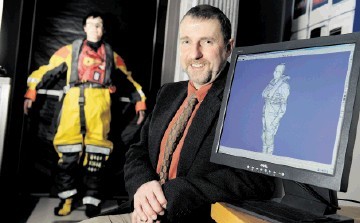
A research project using the latest technology has been initiated in Aberdeen to measure both the size and shape of offshore workers.
The project is being led by academics at Robert Gordon University’s Institute of Health and Welfare Research (IHWR) who are working in partnership with experts from Oil and Gas UK.
The size of workers throughout the UK is increasing and over the last 10 years the average weight of oil workers has risen by three stone. It will be enlightening to see how offshore workers have fared since the last survey was undertaken in the mid-1980s.
Carrying excess weight has implications for all workers but for offshore workers it has particular safety implications.
Offshore workers sometimes need to work in confined spaces and have to travel to and from work in helicopters which have limited space.
They must be able to escape through a helicopter window in an emergency situation.
If the survey shows that it’s not just the height of offshore workers that has increased but their weight is also getting heavier, then this will have an impact on the design of safety clothing, helicopter seating and space-related work issues.
Excess weight impacts on OGUK offshore medicals and becomes a very serious issue when not only health is at risk but so too are career opportunities.
The results of the survey will give all offshore workers “food for thought” and could be just the inspiration needed to tackle ongoing weight problems.
Energy companies are already targeting workers with a waist size over 37 inches and offering them weight loss programmes via their occupational health providers.
Women are more likely to be on a weight loss diet than men and within workplaces the latest diets are often topics of conversation.
Although short-term cranky diets don’t hold the solution for gradual and permanent weight loss, women are getting more and more aware of the nutritional and weight gaining aspects of various foodstuff.
If you are a man contemplating weight loss why not speak to female friends, colleagues and family – they’ll probably be only too pleased to pass on information and advice. If your partner is eating nutritious, weight-conscious meals you could join her and see how you get on.
A good start to losing weight is to learn some basic rules of healthy eating such as:
o Eating more fruit and vegetables (remember the five-a-day recommendation)
o Cutting down on fatty and fried foods and opting for natural and unprocessed foods
o Switching to low-fat dairy products wherever possible
o Choosing lean cuts of meat
o Reducing portion sizes (a reduced portion served on a smaller plate won’t look so diminished)
o Cutting down sugar intake (remember that many processed foods contain sugar so start reading the labels when you do your shopping)
o Adding more fish to your diet and make sure to include oil fish like mackerel, salmon and fresh tuna
o Remembering that alcohol contains “empty calories”. Alcohol calories will cause you to gain weight but they don’t have nutritional value. When onshore it’s easy to drink more to make up for lost time and to be “one of the lads” but remember that a pint of strong lager contains 250 calories. If you feel a bit awkward about turning down drinks or kebabs, you could always tell a small white lie and say that you are in training for a sporting event.
There is now a variety of weight loss plans designed specifically for men which provide online tools and apps for smart phones that help you to track food consumption and weight loss.
These weight loss programmes enable workers “on the go” to gain nutritional knowledge and watch their progress wherever they are.
Reaching and maintaining a healthy weight helps to keep us more active and has hugely beneficial effects for our health.
The detrimental effects of obesity carry risks for a host of conditions including; Type-2 diabetes, coronary heart disease, high blood pressure, sleep apnoea (a condition causing abnormal pauses in breathing whilst asleep), respiratory problems, stroke, liver disease and some cancers.
If you are worried about needing to lose weight and would like to discuss this important issue with someone, you could start by speaking to your rig medic who can offer advice about modifying your diet and lifestyle and help get you started on the path to achieving your weight loss goal.
Cheryl Carroll is occupational health and medical governance manager, medical services at Abermed